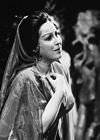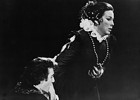ORFEO International – Reviews
Important Releases Briefly Introduced
September 2007
ORFEO 1 CD C 731 071 B
In Mozart in particular she was admired above all for the clarity of her timbre and her consistently lean-toned intonation that was free of all impurities. But it would be wrong to forget that Gundula Janowitz’s 
Gundul Janowitz
Foto: Foto Fayerneedle-sharp accuracy never impeded her emotional and dramatic involvement in a role. Quite the opposite, in fact – the simplicity and nobility of her singing very much predestined her for the roles with which she was most closely associated: the Countess in Le nozze di Figaro, Donna Anna (and, later, Donna Elvira) in Don Giovanni, Elisabetta in Verdi’s Don Carlo and the title role in Richard Strauss’s Ariadne auf Naxos, the role in which she bade farewell to the operatic stage at the Vienna State Opera in 1990, by which date she had sung the part almost fifty times at the Vienna State Opera alone.
She began her career at the house on the Ringstraße three decades earlier as a student, making her Bayreuth Festival début as a Flowermaiden in Parsifal at more or less the same time. Throughout this period she was encouraged by Herbert von Karajan, under whose guidance she advanced as far as she dared into the jugendlich-dramatisch repertory, appearing as Wagner’s Sieglinde 
Gundula Janowitz
Foto: Foto Fayerand even as the Empress in Strauss’s Die Frau ohne Schatten. In the event, however, these roles – like that of Leonore in Beethoven’s Fidelio, which she first sang in 1976 – remained the exception to the rule. Instead, she exercised admirable self-restraint, limiting herself to the lyric soprano repertory, although even here there were surprises that included the title role in Smetana’s The Bartered Bride, Amelia in Verdi’s Simon Boccanegra and Drusilla in the curious arrangement of Monteverdi’s L’incoronazione di Poppea that Karajan conducted in Vienna in 1963.
top |